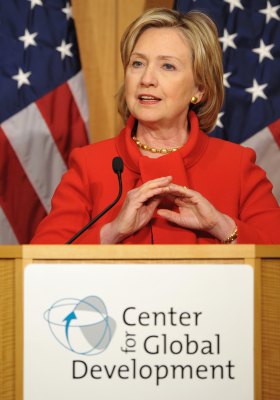Bill and Melinda Gates are making a big media presentation today at 7pm of their Living Proof Project, in which they document aid successes in health. They call themselves “Impatient Optimists.” We can comment more after we hear their presentation. However, they invited comment already by posting progress reports on the Living Proof website.
Actually, we have also previously argued that aid has been more successful in health than in other areas. However, one petty and parochial concern we had about the progress reports is that Bill and Melinda Gates continue to make a case for malaria success stories based on bad or fake data that we have criticized on this blog already twice. The Gateses were aware of our blog because they responded to it at the Chronicle of Philanthropy.
Yet they continue to use the WHO 2008 World Malaria Report as their main source for data on malaria prevalence and deaths from malaria in Africa. As we pointed out in the earlier post, the report establishes such low standards for data reliability that some of the numbers hardly seem worth quoting. From the WHO report: “reliable data on malaria are scarce. In these countries estimates were developed based on local climate conditions, which correlate with malaria risk, and the average rate at which people become ill with the disease in the area.” Where convincing estimates from real reported cases of malaria could not be made, figures were extrapolated “from an empirical relationship between measures of malaria transmission risk and case incidence.”
In Rwanda, which the Gateses say showed a dramatic 45 percent reduction in the number of deaths from 2001 to 2006, a closer look at the WHO data shows that there is an estimate of 3.3 million malaria cases in 2006, with an upper bound of 4.1 million and a lower bound of 2.5 million. And, according to which method is used to estimate cases, the trend can be made to show that malaria incidence is actually on the rise. The Gateses also highlight Zambia as a “remarkable success,” claiming that “overall malaria deaths decreased by 37 percent between 2001 and 2006.” While they provide no citation for this figure it appears to come from the very same WHO report, which concedes that compared to African countries with smaller populations, “nationwide effects of malaria control, as judged from surveillance data” in Zambia are “less clear.”
The downside of all this is that it appears we are having no effect whatsoever on the Gates’ use of fake or bad numbers and thus on the highest profile analysis of malaria in the world. The Gateses ignore our recommendation (and that of others) that they invest MUCH more in better data collection to know when GENUINE progress is happening. (Would Gates have put up with a Microsoft marketing executive who reported Windows sales were somewhere between 2.5 and 4.1 million, which may be either lower or higher than previous periods’ equally unreliable numbers?) Are we insanely pig-headed for insisting that African malaria data be something a little more reliable than if the Gateses had asked the pre-K class at the Microsoft Day Care Center to give their guess?
Well, this is the third time we are saying this on this blog, so maybe we should give up. When people like the Gateses are so tenacious in the face of well-documented errors, it’s time for us economists to shift from normative recommendations (don’t claim progress based on pseudo-data!) to positive theory (what are the incentives to use bad numbers?)
What is the political economy of “impatient optimism”? Here is a possible political economy story – there are two types of political actors: (1) those who care more about the poor and want to make more effort to help them relative to other public priorities, and (2) those who care less and want to make less effort relative to other priorities.
Empirical studies and data that show that aid programs are having very positive results are very helpful to (1) and not to (2), while of course the reverse is helpful to (2) and not to (1). So each type has an incentive to selectively choose studies and data. Knowing this and knowing the public knows this, the caring type (1) might want to signal they are indeed caring by emphasizing positive studies and data, and may have no incentive to actually evaluate whether the positive data are correct or not. So the Gateses might want to say (as they did): “The money the US spends in developing countries to prevent disease and fight poverty is effective, empowers people, and is appreciated.”
If this purely descriptive theory is true, it could explain why some political actors stubbornly stick to positive data even if some obscure academic argues it is false or unreliable.
It cuts both ways – the anti-aid political actors would also have no incentive to recheck their favorite data or studies. Then the debate over evidence will not really be an intellectual debate at all, but just a political contest between two different political types.
Of course, we HATE this political economy theory when it’s applied to US. We are VERY unhappy when people conclude that because we are skeptical about malaria data quality (and thus whether they show progress), therefore we really don’t care about how many Africans are dying from malaria and wish that all government money went to subsidize fine dining in New York. And, the Gateses would probably not be fond of this political economy explanation of their actions and beliefs either. Both of us would prefer the alternative “academic” theory of belief formation, in which it is all based on evidence and data, not political interests.
How to distinguish which theory explains the behavior of any one actor is determined by the response to evidence AGAINST one’s prior position – do you change your beliefs at all? The Gateses seem to fail this test on malaria numbers. We hope we do better when it comes our time to be tested, as we should be.
 Happy election day! Aid Watch is unable to maintain any pretense of doing its normal business in the midst of all the excitement. Please vote early and often for the candidate of your choice, as long as they passed 8th grade science.
Happy election day! Aid Watch is unable to maintain any pretense of doing its normal business in the midst of all the excitement. Please vote early and often for the candidate of your choice, as long as they passed 8th grade science. From Aid to Equality
From Aid to Equality





 This is my
This is my